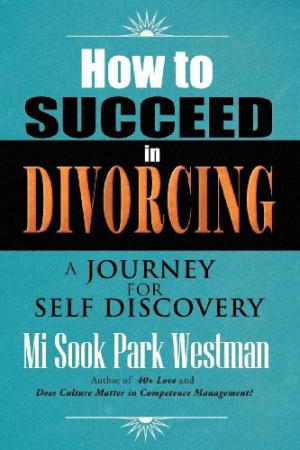How to Succeed in Divorcing
A Journey for Self Discovery
Couples usually marry with the intent of staying together for the rest of their lives, but sometimes that intention falters and divorce becomes preferable to continuing the marriage. Two people who once loved each must then let go of being together and adapt to living separate lives.
In publishing How to Succeed in Divorcing, Mi Sook Park Westman hopes to help others by sharing the emotional pitfalls she encountered while going through a divorce from her husband of seventeen years. The four main chapters describe the stages she identifies as chaos, agony, normalization, and inspiration. As the subtitle indicates, Westman found inner strength and discovered a new “self” while transitioning to single status. She suggests keeping a diary or journal, maintaining a positive attitude toward one’s ex-partner, and taking time for daily quiet moments. Getting involved in physical exercise, social networking, cultural and domestic diversions, and seeking good psychological and legal advice are other ways to mitigate the adjustment to divorce. The appendix lists aphorisms to encourage a positive outlook.
Children suffer when parents fail to control emotional behavior while negotiating separation and divorce. The mother of two young girls, Westman believes that even small amounts of alcohol lower inhibitions enough to cause angry outbursts that make children feel insecure and afraid. She writes, “Instead, it is a good idea to have some coffee or tea when you want to have a calm and constructive dialogue together with your partner.”
Listening to appropriate music and reading inspirational words help people cope with unexpected mood swings. Westman suggests the Internet as a good source for locating music, prose, and poetry that uplift mind and spirit. She found comfort in reading and listening to music at the beginning and end of each day.
When a partner behaves badly, the alienated spouse usually thinks more about revenge than forgiveness. According to Westman, the way to forgiveness involves releasing anger, admitting weaknesses, and recognizing the positive reasons for making this difficult effort: “Hating someone hurts you more than the person who has really caused your pain.”
Westman was educated in Korea, her native country, and in Sweden, where she lives and has worked in business enterprises. She’s also published an anthology of poetry and a book about the effects of culture on business management.
This brief self-help book offers good suggestions for solving problems inherent in the divorce process and practical tips for establishing an independent life. However, the author’s limited command of the English language hampers her ability to express these ideas clearly. The narrative lacks organization and also suffers from muddled syntax. Oft-repeated facts, mistakes in subject-verb and personal-pronoun agreement, point-of-view switches, and typographical errors further challenge reader comprehension. Occasional off-color slang may offend some readers.
Despite these shortcomings, Westman makes an earnest effort to describe her difficulties during a painful divorce, and readers who persevere will discover value in her book.
Reviewed by
Margaret Cullison
Disclosure: This article is not an endorsement, but a review. The publisher of this book provided free copies of the book and paid a small fee to have their book reviewed by a professional reviewer. Foreword Reviews and Clarion Reviews make no guarantee that the publisher will receive a positive review. Foreword Magazine, Inc. is disclosing this in accordance with the Federal Trade Commission’s 16 CFR, Part 255.

